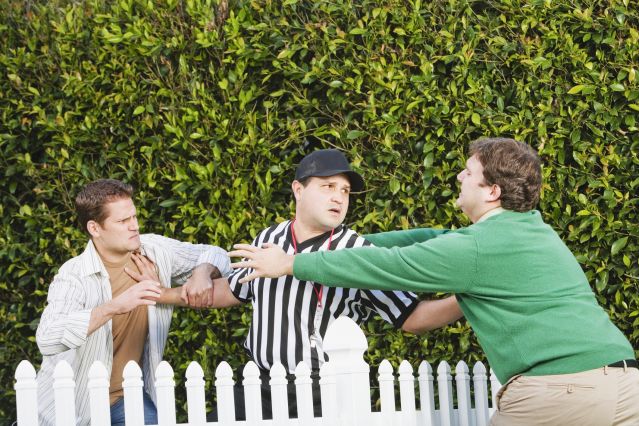Friends
When Neutrality Doesn't Feel Neutral
What is a "neutral friend'? And do you really want one?
Posted December 11, 2023 Reviewed by Hara Estroff Marano
Key points
- A “neutral friend” typically avoids taking either side when you have a dispute with another person.
- Such a person often has motivations to remain neutral other than morals, values, or your best interests.
- As soon as you notice such a neutral pattern, ask your neutral friend directly about their underlying reason.

A “neutral friend” is someone who may assert that he or she is your friend but typically avoids taking either side whenever you have some type of dispute with another person. Such a person may claim that he or she is trying to avoid drama, remain impartial, or even serve as a “peacemaker.” But the big question is whether you would view such a friend as a valuable peacemaker."
A report in the Journal of Experimental Social Psychology wasn't too positive about such neutral friends. The publication described three studies that evaluated how people would react when they were engaged in a dispute with another person and had a friend who took one of the following three positions: being supportive, being oppositional, or remaining neutral. And spoiler alert, the reaction to the neutral friend was never neutral.
Not surprisingly, study participants reacted positively when the friend provided support. After all, isn't support during challenging times one of the key things that you look for in a good friend? Also not surprisingly, study participants felt negatively about a friend who opposed them during the conflict.
The key finding, though, is that study participants reacted just as negatively to a friend who remained neutral as to a friend who opposed them. This negative reaction to this "neutrality" was even stronger when the opponent was a distant friend rather than an equally close friend.

The title of this publication was a very telling, "Whoever is not with me is against me: The costs of neutrality among friends." Like Swiss cheese, staying neutral has its holes. Naturally, when your friend leaves you to battle on your own, you can end up being more vulnerable. The lack of support from a supposed friend can suggest to others that your friend actually supports your adversary instead.
Even if you can deal with the conflict by yourself, the lack of support can feel like betrayal. Hence the synonyms for "neutral friend" like "fence-walker," "fence-sitter," "unattached," "uninvolved," or "unaffiliated," which are not exactly terms of endearment.
Keep in mind that the term "neutral friend" here applies to someone who frequently or consistently stays on the fence during your conflicts rather than in just a few isolated situations. In other words, the person is indeed "net neutral" towards you over time.
The term shouldn't apply to a friend who happens to take an ostensibly neutral stance in a particular situation that may end up benefiting you. For example, your friend may act neutral in the interest of keeping you safe and removing you from the conflict. Or perhaps your friend notices a better solution for you than the argument that you are currently pursuing. Your friend could even recognize that a genuine misunderstanding exists between you and your opponent and be seeking to resolve it.
Plus, even your best of friends won't necessarily support you in every possible dispute. Say you ran into a grocery store and demanded that the store stop selling all avocados forever. That may be a bit much for your friend, depending on how much he or she likes avocado toast. Heck, everyone has lines that can't be crossed.
By contrast, it's different when a friend continuously stays perched on the fence regardless of how much in the right you may be in a conflict. Such a person usually is not staying neutral out of morals, values, or your best interests. Rather, that person may be motivated by one of the following:
- Fear: Your "neutral friend" may be flat-out afraid to stick up for you, fearing any repercussions from your opponent. It can be the classic schoolyard or workplace bully situation, where everyone watches on the sidelines when someone gets bullied. Alternatively, your friend may be very conflict-averse and allow that to overwhelm any sense of loyalty to you.
- The need to people-please: Your "neutral friend" may feel an intense need to keep everyone happy, which, of course, may fail because it's leaving you quite unhappy. Trying to keep everyone happy amidst a conflict can be like trying to keep your hair neatly combed amidst a hurricane.
- Demonstrating "independence": Some people may feel the need to remain completely unaffiliated with anyone else, picturing themselves as "free agents" or "above everyone." They may say something like, "You don't own me." But a friend certainly can be truly free or independent and still support you when you need it.
- Superficiality: Some people can't or don't want to maintain deeper connections, such as getting involved in your conflicts.
- Hidden agendas: Maybe you're not part of the cool crowd, so your friend doesn't want to be fully associated with you. Maybe your friend wants to maintain connections with others, including your adversary, for personal or professional gain. Consistent neutrality can be a sign that something else is going on with your friend.
- Your disposability: Yes, there are fair-weather friends out there, those who are friends with you only during the good times or when they continue to get things from you. Conflict with others can be like a gigantic wind tunnel, uncovering friends' true feelings about you.
A friend's continuing neutrality through all circumstances could be a big red flag. But unlike the flag of Switzerland, this red flag may not have any plus signs.
As soon as you notice such a neutral pattern, assuming that it bothers you, ask your neutral friend directly why he or she continues to walk the fence. Be straightforward and up-front about how it makes you feel. You don't want to keep such feelings bottled up until they explode one day. After confronting your neutral friend about thee issues, if you don't get satisfactory answers and resolution, then maybe it's time to move on from the friendship.


